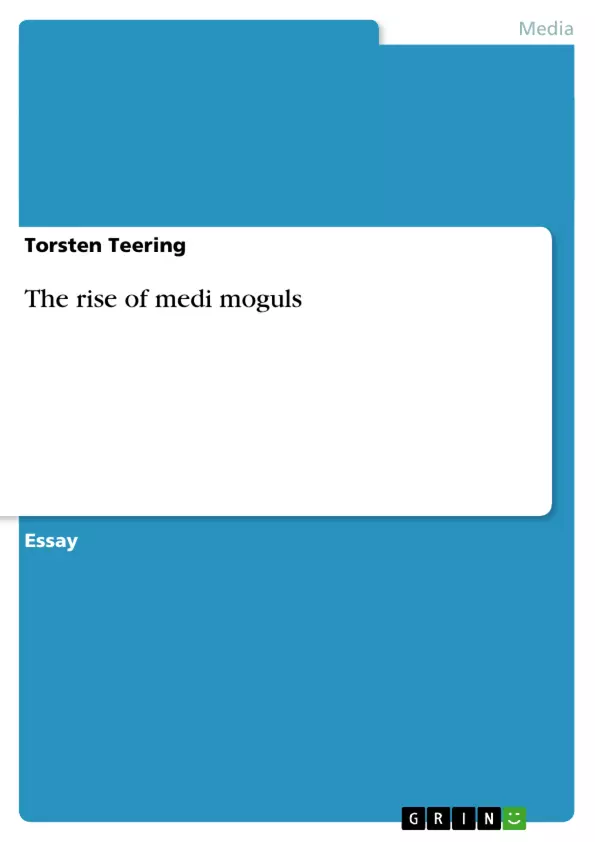The late 1970s were a phase where the idea of strengthening anti-monopoly legislation became imminent but both the Labour and the Conservative government since 1977 ignored the advice from the Press Commission to strengthen it. This was the reason why the antimonopoly law in 1981 was ineffective and Rupert Murdoch was given permission to buy The Times and the Sunday Times. At this period Murdoch owned national daily newspapers with 30 per cent circulation of all British newspapers, and national Sunday newspapers with 31 per cent circulation. The take-overs have not even been referred to the Monopolies Commission (Curran, 1991).
1986 marked a big change for the press in Britain. The Employment Acts of 1980 and 1982 by the Conservative government weakened the power of the trade unions. Until this time the press owners were forced to accept that the unions were against new technologies, which would decrease the amount of workers, and which could strengthen the proprietor’s role and financial success. It was Rupert Murdoch again who gained from this political change the most: In 1985 he built a new computerised printing plant in Wapping, while the union protested against the change. The members finally went on strike on January 24 th 1986, which gave Murdoch under the new Conservative employment law the right to dismiss the print workers without being required to give them expensive compensations. Murdoch lost only one day before his new system in Wapping produced the first newspaper editions because he transferred all technology while negotiating with the union. The new technology transformed the cost structure and increased the profitability of media companies (McNair, 1996).
The economy of the 1980s changed to an “Alliance capitalism” which made it possible that for example Murdoch’s company News Corporation owned newspapers in the United States of America and the United Kingdom. These control and have directorial influence over the two biggest news agencies of the world Reuters and Associated Press which insist to be able to prevent any take-over. In the 1980s changing practises in particular of the entertainment industries with a few enormous multi-national companies dominating the market occurred. This decreased the competition and created oligopolies with industry sectors shared by a few global companies. A British example is again Rupert Murdoch owning Fox in America, Star TV in Asia and Sky in the UK (Paterson, 1998). [...]
Inhaltsverzeichnis (Table of Contents)
- The Rise of Media Moguls
- The Rise of the Grade Brothers
- Ineffectiveness of Anti-Monopoly Law
- The Weakening of Unions
- Alliance Capitalism and Technological Innovation
- The Broadcasting Acts of 1990 and 1996
- Concerns about the Rise of Media Moguls
Zielsetzung und Themenschwerpunkte (Objectives and Key Themes)
This essay examines the economic and political changes that have contributed to the rise of media moguls in Britain during the latter half of the twentieth century. It analyzes the impact of commercial television, the weakening of anti-monopoly law, the decline of union power, the rise of alliance capitalism and technological innovation, and the influence of broadcasting acts on media ownership and concentration.
- The rise of commercial television and its impact on media ownership.
- The changing political landscape and its influence on media regulations.
- The role of technological innovation in shaping media markets.
- The impact of media concentration on editorial independence and political influence.
- The concerns surrounding the growing power of media moguls.
Zusammenfassung der Kapitel (Chapter Summaries)
- The essay begins by analyzing the introduction of commercial television (ITV) in Britain in 1955 and the lack of restrictions that allowed the rise of the Grade brothers as dominant figures in the industry.
- It then explores the period from the late 1970s to the early 1990s, highlighting the ineffectiveness of anti-monopoly laws and the political changes that weakened trade unions. The essay discusses how these factors facilitated the rise of media moguls like Rupert Murdoch.
- Further, the essay examines the economic shift toward "Alliance capitalism" in the 1980s and the role of new technologies like the Internet in reshaping the media landscape. The essay emphasizes the consolidation of media ownership and the emergence of global media moguls.
- The essay analyzes the Broadcasting Acts of 1990 and 1996, exploring their impact on media ownership and concentration. It discusses the deregulation of broadcasting and the increasing power of media moguls.
Schlüsselwörter (Keywords)
This essay focuses on the key themes of media ownership, media concentration, political influence, technological innovation, and the rise of media moguls in Britain. It examines the interplay between economic, political, and technological factors in shaping the media landscape, specifically focusing on the impact of individuals like the Grade brothers and Rupert Murdoch.
Frequently Asked Questions
What factors contributed to the rise of media moguls in Britain?
Key factors included the introduction of commercial television (ITV), the weakening of anti-monopoly laws in the 1980s, and the decline of trade union power under the Conservative government.
How did Rupert Murdoch influence the British press landscape?
Murdoch acquired major titles like The Times and The Sunday Times. His move to a computerized printing plant in Wapping in 1986 broke the power of the print unions and revolutionized media profitability.
What is "Alliance Capitalism"?
It refers to the economic shift in the 1980s where multi-national companies formed global networks, leading to media oligopolies where a few global players dominate international markets.
What was the impact of the Broadcasting Acts of 1990 and 1996?
These acts led to significant deregulation, allowing for greater concentration of media ownership and increasing the political influence of large media corporations.
Why are media moguls often viewed with concern?
There are concerns about the loss of editorial independence, the reduction of competition, and the immense political power individuals like Rupert Murdoch can exert through their media empires.
- Citation du texte
- Torsten Teering (Auteur), 2002, The rise of medi moguls, Munich, GRIN Verlag, https://www.grin.com/document/17383



